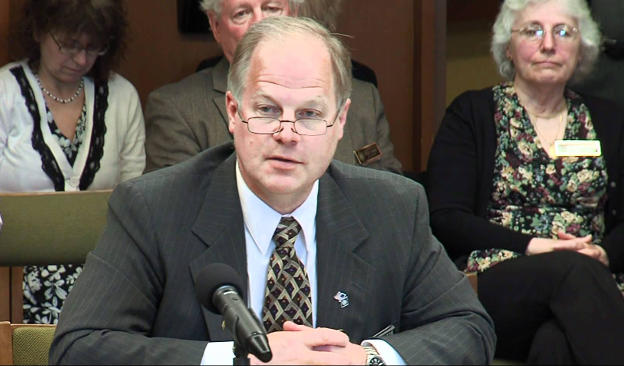State Rep. Dan Itse, R-Fremont, provides a Republican perspective to what’s going on in the legislature each week for InDepthNH.org readers. An engineer, Itse has represented Rockingham County since 2001.
Rep. Dan Itse, R-Fremont
View from the Inside
After two weeks without a Session Day, last week the New Hampshire House of Representatives voted on the budget.
It was a surprising and contentious two days. As is often the case we will begin with a primer in the State budget. New Hampshire executes on a biennial (two-year basis).
The budget before the Legislature is the 2018/2019 budget. In accordance with statute, the governor recommends a budget to the House of Representatives in February. This process starts in August of the preceding year, therefore, the governor’s budget was begun by bureaucrats appointed by Gov. Hassan under Gov. Hassan.
After the governor’s budget is presented to the Legislature, it metamorphose into HB1, HB2, and HB25. HB1 is the line item appropriations for each department necessary to carry out the programs instituted by the Legislature and to pay the employees of the state.
HB2 is the statutory changes if necessary from existing statutes necessary to execute HB1 plus some additional spending in program changes or additions. HB25 is the capital appropriations for long term such as buildings, bridges and roads, which are typically bonded.
Once HB1 and HB2 are created, the House Committee on Finance begin their work changing the governor’s budget into the House budget. Per the Constitution of the State of New Hampshire, Part 2, Article 18-a, the budget has to being as a House Bill.
The budget is divided into several general categories. The increase in the 2018/2019 budget relative to the 2016/2017 increased is shown in parentheses for each general category as follows: General Government 5.1%, Administration of Justice and Public Protection 11.0%, Resource Protection and Development 12.4%, Transportation 5.4%, Health and Social Services 8.9%, and Education -0.1%.
Most of these are funded by a combination of the general fund and federal funds. In addition, Transportation is also funded by the highway taxes and fees segregated by the Constitution, and Education is also funded by the state-wide property tax, cigarette tax, and the lottery, which is segregated by the Constitution.
From the funding side the budget is divided into the general fund, federal funds, highway funds, Fish and Game funds and other funds. The general fund is the non-dedicated taxes and fees such as the Business and Enterprise Tax and Business Profits tax. The other funds includes the such as the Education Trust Fund. Federal funds are largely a function of money spent in Transportation, Health and Social Services, and Education as they are generally matching funds. The spending from the general fund is what the Legislature can actually control directly.
The budget proposed in HB1 increased the state budget $11.196B in 2016/2017 to $11,854B, a seemingly modest 5.9% (2.9% annual) increase. However, the general fund spending, that which we actually control increased from $2.838B in 2016/2017 to $3.136B in 2018/2019, a 8.9% (4.3% annual) increase.
When the HB2 changes are added in, the increase jumps to a whopping 10.52% (5.12% annual). Furthermore, the proposed budget has $219M in hidden spending of federal funds. These were “removed” at the last minute to drop the budget below $12B.
The intent is to receive these funds which include IDEA Special Education funding and Medicaid to schools (money that has already been spent locally) through the Fiscal Committee after the Legislature is out of Session.
So what happened last week. A group of conservative legislators realized that the general fund spending, the money we take out of the New Hampshire economy, was going to increase dramatically, far more than the current 1.5% inflation rate, the 0.8% cost of living increase in Social Security or the typical interest rate on a bank account.
The NHGOP platform has two budget criteria: that there be no new taxes or fees; that spending not increase more than inflation plus population growth. Furthermore, it was recognized that there was budget cut ($219M) that was simply a lie.
By the time Monday rolled around, at least 40 Republicans had committed to vote against a budget that did not conform to the NHGOP platform.
Going into Session on Wednesday, April 6, Calendar 18C had 8 amendments introduced to reduce the budget. The first vote was whether or not to adopt the Committee Amendment making the governor’s budget into HB1. That motion failed 134 to 220 with 66 Republicans not supporting the Committee Amendment.
Next the Ammon Amendment, which reduced the increase in general funding to 3% with “back of the budget cuts,” was considered and failed 75 to 282. Finally, the Eaton Amendment was proposed to increase spending, which failed 162 to 196. At that point, HB1 was laid upon the table by a voice vote. One Amendment to HB25, the capital appropriations Bill, failed 72 to 276, but another passed by a voice vote.
Going into Session, there were two more amendments to HB1 to reduce the budget, but no attempt was made to take HB1 off the table. The Committee Amendment to HB2 was considered first and failed 169 to 177. Then the House went into recess. It was the first Session Day that I remember attending that lasted less than an hour.
There were also a host of amendments to HB1 proposed to reduce the budget, which were ruled non-germane.
One-third of the Republicans wanted a budget that was lower than that proposed by the Committee on Finance. They required a budget that wasn’t a lie, pretending to cut federal funds that would come in through the back door anyway. They required a budget that would conform to the NHGOP Platform … completely.
For my part, I would sooner vote for an honest $12.1B than a faux $11.9B, and I won’t vote for a $12.1B that increases general fund spending by 8.9%. They had the votes to accomplish their objective and the Speaker refused to negotiate. Furthermore, the outcome of the vote on HB1 was known by all parties by Monday morning.
At this point, all three factions will work with the Senate Committee on Finance to try and influence their proposed budget which they will amend to House Bills making appropriations. Any changes the House of Representatives may propose will be made in a Committee of Conference, but the House has no official position to defend. However the Senate will also be aware of the standard imposed by the New Hampshire Freedom Caucus.
Dan Itse
Hon. Daniel C. Itse
New Hampshire State Representative,
Rockingham County, District 10, Fremont
Government cannot create wealth; individuals create wealth, and governments consume it.
Updated: To show HB 25 ultimately passed with amendment by voice vote and is now in the Senate, and that the House Committee on Finance didn’t work on it.





